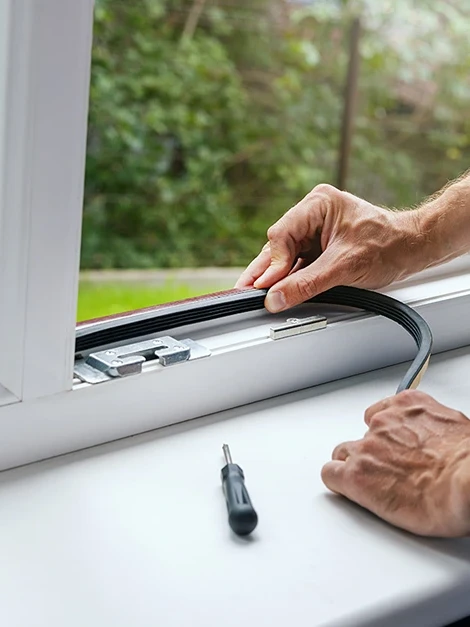Condensation, particularly, when it happens inside your windows, is not a massive problem. It means that they are working well and are still in good working condition, hence making the temperature within your property remain warmer than outside.Newer windows tend to make more condensation, which is because they have the ability to reduce drafts inside better than older windows.So what causes condensation inside double glazed windows? Condensation happens when drops form on the windows. That can be harmful to the windows because it means that there is too much water and can eventually damage them. Needless to say, this can also mean that there are larger problems with moisture in the house.But there is more to know about this topic and we’ll go through all the details that you may want to know about condensation in your windows and what it means for your property.
Considering replacement windows?
Does Condensation Totally Disappear With Double Glazing?
Condensation happens on both single and double glazed windows function. Double glazing is not a panacea, and it does not simply fix all the problems as there is still a significant temperature difference between outside air and inside air. Double glazed windows may help reduce condensation due to the thermal break between the two panes of glass; however, it does not guarantee that condensation will not occur at all once you get double glazing.
What Causes Condensation Inside Double Glazing Windows?
Double glazed windows retain heat from passing through in one direction. They are able to do this by putting a layer of gas between two pieces of glass. Learn more about our double glazing in Glasgow services. When the heat increases on either side, it is difficult for the heat to go through the inner layer. Instead, it gets sent back into your home.If you insulate your windows, it can help you cut down on the power bill. This is because the heat that would have escaped cannot in this case. It also makes a significant distinction in temperature between the inside part of the window and the outside.Condensation is caused by the same physical principle that causes dew on outside windows during the night. Condensation appears inside our homes when air comes into contact with some colder surface. A lot of condensation occurs because there are changes in temperature or humidity levels taking place both outside and inside your property simultaneously. For example, suppose you have central heating on, and the outdoor temperature drops below 10 degrees. In that case, this will cause excess moisture to form within your home as it does not yet reach this temperature itself – forming condensation droplets on cold surfaces like window panes or radiators.
Why is Condensation Bad for Your Property?
As we mentioned previously, condensation on windows can be harmful. It might encourage mould that could potentially damage the frame of your windows and your property as a result.Condensation might also show that your home is too humid, which can be potentially dangerous.As a whole, condensation is a problem because it can harm wallpaper, furniture, and clothing. It also means that you might have to scrub water spots off the walls, which is just something you don’t want.
How To Reduce Condensation In Your House?
You can adopt several different measures to prevent the formation of condensation on your double-glazed windows. Here are some home methods for avoiding condensation.
Ventilate Your Rooms and Open the Windows Regularly
It’s easy to forget about the windows when it’s so cold outside. On average, aim for 20 minutes of sunlight per day (even during the winter). This will allow moist air to exit and (unless it’s exceptionally humid) fresh air to enter. You may also reduce condensation by utilizing trickle vents.
 An Extractor Fan is a Good Idea
An Extractor Fan is a Good Idea
An extractor fan can assist in removing moist air from your space before it can settle on surfaces and cause problems while you cook or take a shower.
Invest in a Dehumidifier
If the measures above do not solve the problem or at least sufficiently reduce condensation in your house, consider investing in a dehumidifier. A dehumidifier will remove moisture from the air and decrease the chances of mould formation in the property.
Don’t Dry Your Clothes Inside
Wet clothes can make a lot of water vapour. This is bad for the air because it increases the humidity level in the room. If you are not able to dry your clothes outside, make sure they are as ventilated as possible.
Too Many Houseplants
The more plants you have inside, the higher the humidity in the air will eventually be. This is because plants need constant watering, and the more water you use for them, the higher the chances of condensation in your property. Consider moving your plants in your garden or your balcony during the summertime. Alternatively, you can add plants that are actually able to absorb humidity. The best plants for this are palms, ferns, and cactus.
Can I Stop Condensation Formation with Vinegar?
The short answer is no; you can’t simply stop condensation from forming by using vinegar. However, what you can do is remove the accumulated moisture from your windows with vinegar.In fact, there is a simple homemade cleaning solution you can utilize to eliminate the moisture that has already built up. Mix two cups of water with two cups of vinegar in a spray bottle and add some washing liquid on top.After that, spray the solution on the window and then use a cleaning cloth (ensuring that the surface isn’t too rough so you won’t scratch the glass) to clean it off. Allow to air-dry afterwards.This solution will also work as an all-purpose window cleaner, removing both condensation and moisture. However, if your windows are double-glazed, condensation may have developed between the two panes. If this is the case, you’ll need to call a window expert to repair or replace the glass.
 Conclusion
Conclusion
You need to keep the condensation in your property at the minimum by paying attention to any signs that might lead to it. It’s important to follow the steps above to reduce the formation of condensation much as possible to stay clear of mould.As we discussed in this article, condensation does not mean that your windows are not working well. And remember, the newer they are, the more condensation you’ll have.Windows with frames that have gaps in them will cause drafts and result in more condensation. If you’re noticing excessive moisture inside your home, make sure to prevent it using our best tips above.










